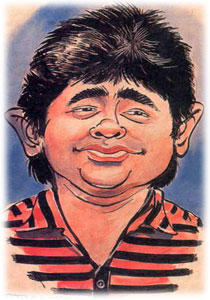| We need to reach out with compassion to help people in pain. |

The concept of ahimsa comes wrapped up with the idea of compassion. Although today we have hijacked it by concentrating mainly on non-violence, we need to remember that it was the idea of compassion that gave way to that of non-violence. It is an amazing fact that this idea of love and caring not just for one’s own family and one’s own little circle, but also extending the same care and love to one who has done you harm, originated and was practised in our country centuries ago, by both kings and the common person alike. Just imagine how revolutionary this idea must have been at the time when hurting the person who hurt you, or being indifferent to those who were weak or poor or sick, was the norm. The first people who practised this kind of ahimsa with compassion as its main component, not just towards people, but also towards animals and all of Creation must have been people with great hearts.
Importance of empathy
Compassion flows straight from one heart to another and reaches out to those who deserve it, and those who don’t. Often we think that compassion is that feeling which makes us feel sorry for someone who is poor, sick or suffering in some way. On a superficial level, we toss a coin, give away an old sari, or write a cheque. Ahimsa teaches us that real compassion is more than just this.
It is using our hearts to feel someone’s pain, insecurity, fears, injustices, and reaching out to support, relieve and help them through this.
The compassion that ahimsa brings is active. We need not only to open our eyes, but also open our hearts and reach out with our hands. To do this one needs a heart that can feel. One of the lessons I learnt from a Vietnamese doctor was to actually want a heart that I could feel. This might seem strange as, in today’s world, it is easier not to feel. The mechanical way in which we live today makes us harden our hearts to any kind of feeling. When we stop feeling, we stop connecting. When we stop connecting, we become himsa people, caring only about ourselves. My Vietnamese friend who was a doctor was chased and hunted by the army and spent some rough times in refugee camps rife with TB, malaria, fevers and malnutrition. One night, in desperation, he caught a boat to America and found his freedom — or so he thought.
Unnerving experience
When he found a job again as doctor, he found that he was listening to well-fed people talking about wanting to lose weight; healthy people wanting surgery to change their noses and other parts of their bodies; very young girls wanting to abort their children; children who were abused in a variety of ways. He became angry and hard and very mean as he listened day after day to such people. He became short tempered with his patients and did not like the person he was becoming. So he went away for a few days and forced himself to remember how the people he had met and treated in the refugee camps felt. He forced himself to remember their anxieties, pain, and fears. Then he came back to work and began to look at his obese patients and neurotic patients in the same way. He put himself in their shoes and tried to understand their fears and worries and over time found that his clinics were busier than his colleagues’ and were always overflowing with patients. The reason? The patients found this doctor was compassionate and much more caring than the others. He had discovered that having a heart that could feel anger, pain, fear, worry, were the skills he needed to being not just a good doctor, but a good person as well.
Compassion is a much-needed ingredient in life for all of us, but more so for those in the healing and teaching professions. And somehow, it is here that it also seems to be missing the most in today’s life. A gardener’s children who go to local school were punished for not bringing Rs. 50 for something and the parents were scolded. “If you can’t afford to pay such a small amount of money even, then you are not fit to educate your child. ” The poor parent came away in great agony and went back to borrow some money.
Need of the hour
A woman I know had great difficulty when she was a young mother. Her boss was a spinster and could not understand why this woman took a day off when her baby was sick, or was teething. When this woman herself became the boss, I thought she would be more compassionate and understanding to her female staff. But sadly, she was just like her old boss. Hard and sometimes very mean. A truly himsa person. When we experience himsa behaviour, it becomes even more important that we practise ahimsa, to prevent our families and workplaces from disintegrating into ugly places.
Ahimsa teaches us that having a heart that can feel not only brings pain, but also great joy.
If you are an ahimsa person and have a story to share please write to the author at ushajesudasan@gmail.com

No comments:
Post a Comment